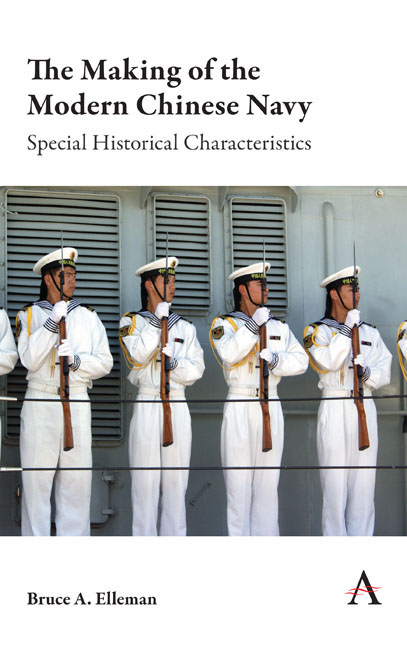Book contents
- Frontmatter
- Contents
- Introduction: The Special Characteristics of China's Maritime History
- 1 Battle of Bạch Đăng River (938)
- 2 Battle of Yaishan (1279)
- 3 Battle of Lake Poyang (1363)
- 4 Ming–Kotte War in Southeast Asia (1410–11)
- 5 Ming Loyalists Flee to Taiwan (1661–83)
- 6 Battle of Chuanbi (1839)
- 7 Sino-French War (1884–85)
- 8 Qing Beiyang Fleet's Defeat in the Battle of the Yellow Sea (1894)
- 9 Chinese Decision to Sink The Nationalist Navy as Blockships (1937)
- 10 Chongqing Mutiny Allowing the PLA to Cross the Yangzi River (1949)
- 11 The Taiwan Strait Crises (1954–55 and 1958)
- 12 China's Decision to Take the Paracel Islands from South Vietnam (1974)
- 13 Missile Blockade: The Taiwan Strait Crisis (1995–96)
- 14 The EP-3 Standoff and Diplomatic Resolution (2001)
- Conclusions: The Influence of History on the Formation of a Modern Chinese Navy
- Selected Bibliography
- Index
Introduction: The Special Characteristics of China's Maritime History
Published online by Cambridge University Press: 04 October 2019
- Frontmatter
- Contents
- Introduction: The Special Characteristics of China's Maritime History
- 1 Battle of Bạch Đăng River (938)
- 2 Battle of Yaishan (1279)
- 3 Battle of Lake Poyang (1363)
- 4 Ming–Kotte War in Southeast Asia (1410–11)
- 5 Ming Loyalists Flee to Taiwan (1661–83)
- 6 Battle of Chuanbi (1839)
- 7 Sino-French War (1884–85)
- 8 Qing Beiyang Fleet's Defeat in the Battle of the Yellow Sea (1894)
- 9 Chinese Decision to Sink The Nationalist Navy as Blockships (1937)
- 10 Chongqing Mutiny Allowing the PLA to Cross the Yangzi River (1949)
- 11 The Taiwan Strait Crises (1954–55 and 1958)
- 12 China's Decision to Take the Paracel Islands from South Vietnam (1974)
- 13 Missile Blockade: The Taiwan Strait Crisis (1995–96)
- 14 The EP-3 Standoff and Diplomatic Resolution (2001)
- Conclusions: The Influence of History on the Formation of a Modern Chinese Navy
- Selected Bibliography
- Index
Summary
Like all countries with a long maritime tradition, there are many unique ways each country's navy fight. The US Navy, for example, is known for never giving up. It still honors John Paul Jones's famous saying “I have not yet begun to fight.” In 1905, Jones's body was even exhumed from a Parisian cemetery and reburied in the Annapolis chapel to symbolize the importance of this American characteristic. Other global navies have their own ingrained beliefs, some of which defy reason, including the Royal Navy half-gill ration of grog per day or how Japanese pilots preferred death, many opting not to bring a parachute with them on missions, to the dishonor of military defeat. The focus of this book will be on those special characteristics that distinguish the Chinese navy.
The fourteen historical case studies presented below will help to illustrate a number of special characteristics that modern-day Chinese naval officers perhaps take for granted, including a belief in the Mandate of Heaven, tributary system, and the fear of “losing face,” either in a diplomatic setting, in a military defeat, or by risking valuable equipment in battle. Ethnic and language differences, regional loyalties, and political mistrust potentially exacerbate these problems. Peculiarities include the Mongol dual-officer diarchy that led to political commissar system utilized by the People's Liberation Army (PLA). Meanwhile, outside naval influences, such as blockade, sanctions, or embargoes, can exert a profound impact on China, just as foreign intervention or, equally important, a decision not to intervene, can often determine the outcome of major maritime events.
Since 1949, two Han Chinese-dominated governments have opposed each other across the Taiwan Strait. Historically, effective rule in China required a strong Mandate of Heaven. Signs of this included the defeat of the ruler's political rivals, the absence of internal rebellions, strong central control over the provinces, and domestic prosperity. As long as the ruler's Mandate of Heaven appeared to be strong, the vast majority of Chinese accepted their fate and would go along with the status quo. If, however, the ruler's Mandate of Heaven seemed questionable, then a new leader might be tempted to claim the mandate for himself while the military could suddenly switch sides in an internal rebellion to abandon the ruling government in favor of its challenger.
- Type
- Chapter
- Information
- The Making of the Modern Chinese NavySpecial Historical Characteristics, pp. 1 - 6Publisher: Anthem PressPrint publication year: 2019



